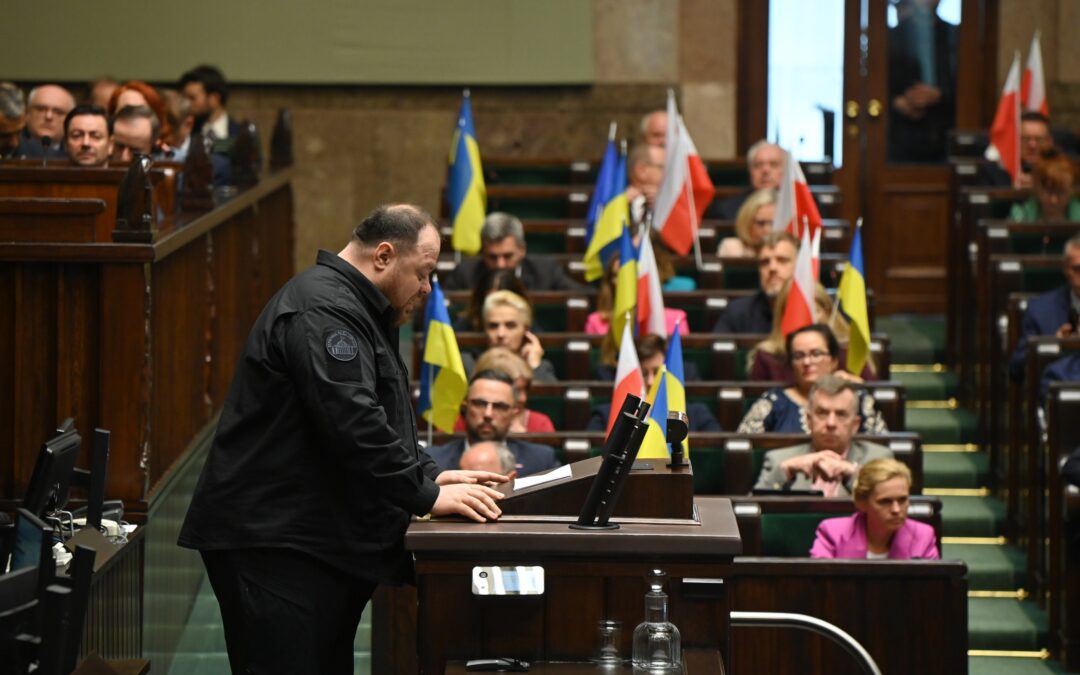The chairman of Ukraine’s parliament has expressed sympathy for the pain felt by Poles over the Volhynia massacres, in which Ukrainian nationalists murdered up to 100,000 ethnic Poles in World War Two. The issue is today a regular cause of tension between two otherwise close allies.
Ruslan Stefanchuk this morning addressed Poland’s parliament in Warsaw. Beginning his speech in Polish, he thanked Poles for the support they have given his country since Russia’s invasion, prompting applause from MPs around the chamber.
Addressed @KancelariaSejmu& @PolskiSenat
Thanked🇵🇱for the help, which is being used well on the battlefield
🇺🇦’ll never forget🇵🇱leadership in creating the tank coalition.🇺🇦sky’s protected by🇵🇱MiGs
We believe: an air coalition’ll be created, in which🇵🇱’ll take a prominent place pic.twitter.com/VTadm3M6ew
— Ruslan Stefanchuk (@r_stefanchuk) May 25, 2023
At the end of his 30-minute address, Stefanchuk noted that this year will see the 80th “anniversary of the terrible events in Volhynia”. Poles regard the massacres, which took place from 1943 to 1945, as a genocide, and parliament has recognised it as such. But Ukraine has rejected the use of that term.
Last weekend, renewed tensions emerged over the issue after the spokesman for Poland’s foreign ministry suggested that Ukrainian president Volodymyr Zelensky should apologise for the massacres. That suggestion was condemned as “unacceptable” by Ukraine’s ambassador to Warsaw.
In his speech today, Stefanchuk declared: “We understand your pain at the loss of your loved ones. I express my sincere sympathy and gratitude to all the families and descendants of the victims of the events in Volhynia of that time for maintaining the memory of their ancestors.”
Ukraine's ambassador has criticised the "unacceptable" suggestion by Poland's foreign ministry spokesman that President @ZelenskyyUa should apologise for the Volhynia massacre, which saw up to 100,000 ethnic Poles killed by Ukrainian nationalists in WWII https://t.co/45QnIsTgpO
— Notes from Poland 🇵🇱 (@notesfrompoland) May 21, 2023
That memory “does not call for revenge or hatred, but serves as a warning that nothing like this will ever happen again between our nations”, he continued, prompting a standing ovation from almost all the MPs present.
“We will work with you, dear Polish friends, accepting the truth no matter how ruthless it may be,” added Stefanchuk to further applause. “Together we must pass this difficult but extremely necessary exam, so that the formula ‘we forgive and ask for forgiveness’ acquires true meaning and a practical dimension.”
“I want us to realise that, perhaps for the first time, history gives [us] a unique opportunity and responsibility to become the creators of a new future of good neighbours,” he concluded. “I want us to write our new history together, without retouching it or tearing out any pages from it.”
Afterwards, Poland’s foreign minister, Zbigniew Rau, welcomed Stefanchuk’s words, telling the Polish Press Agency (PAP) that “we heard what we wanted to hear, it was a very good speech”.
“We are on the right track and this speech proves that our positions have come closer once again,” he added. “There is a lot to build on.”
The Ukrainian leader’s speech was also welcomed by MPs from both the ruling Law and Justice (PiS) party and the opposition, with Bartłomiej Wróblewski of PiS and Stanisław Bukowiec of Agreement (Porozumienie) among those to praise it on Twitter.
Poland’s prime minister says he has received personal assurances from @ZelenskyyUa that Ukraine will permit the exhumation of victims of the Volhynia massacres, in which Ukrainian nationalists killed tens of thousands of ethnic Poles during WWII https://t.co/gJI3YntsHg
— Notes from Poland 🇵🇱 (@notesfrompoland) March 14, 2023
However, Krzysztof Bosak, one of the leaders of the far-right Confederation (Konfederacja), which has adopted a lukewarm attitude towards Ukraine during the war, said Poles should “watch carefully” to see if Ukraine really does permit the exhumation of victims of the massacre, as Stefanchuk suggested it would.
Bosak also noted that much of Stefanchuk’s language was vague (such as “the events in Volhynia”) or appeared to point to the actions of both Poland and Ukraine.
A common narrative in Ukraine has been that the Volhynia massacres must be contextualised by understanding previous Polish treatment of Ukrainians, for example repressive actions taken against them in the interwar Polish republic.
Polish government figures have criticised the “unacceptable” decision by Ukraine to appoint as deputy foreign minister Andrij Melnyk, who recently denied that nationalist leader Stepan Bandera was responsible for the massacre of Poles and Jews during WWII https://t.co/Chr6Xu0p8x
— Notes from Poland 🇵🇱 (@notesfrompoland) November 23, 2022
Main image credit: Sejm RP/Twitter

Daniel Tilles is editor-in-chief of Notes from Poland. He has written on Polish affairs for a wide range of publications, including Foreign Policy, POLITICO Europe, EUobserver and Dziennik Gazeta Prawna.




















